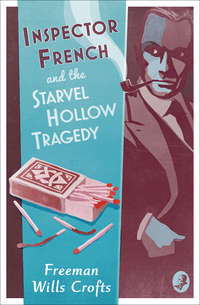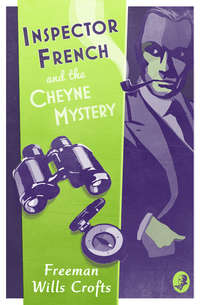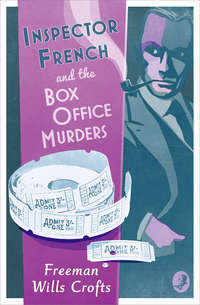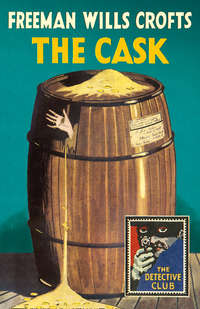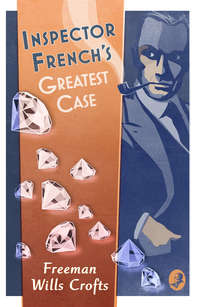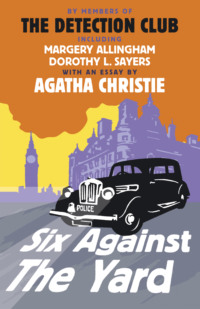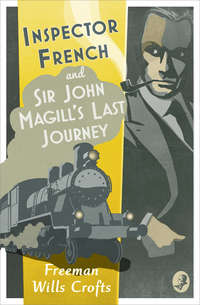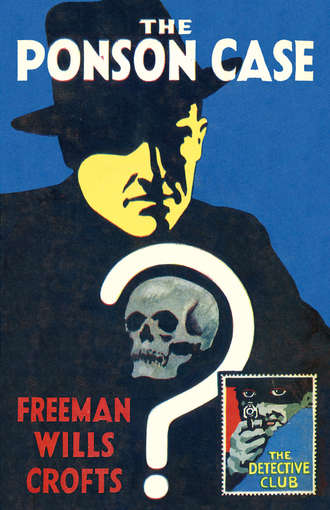
Полная версия
The Ponson Case
But as he was here he might as well begin the interviewing of the Manor servants. He therefore left the boathouse, and walked slowly up to the terrace under the great trees of the lawn, past long herbaceous borders, and through the Dutch garden with its geometrically shaped beds, its boxwood edgings, and its masses of rich colour. Approached from the front, the old house looked its best. Though somewhat heavy and formal in detail, its proportion was admirable, and it had an air of security and comfort strangely at variance with the tragic happening which had overtaken its owner. Tanner labelled it one of the ‘stately homes of England’ as he crossed the terrace to the ornate porch and pulled the bell.
Parkes opened the door. The Inspector introduced himself, and courteously asked for an interview. With equal politeness, and an evident desire to help, Parkes brought his visitor to his own sanctum and told his story. But to Tanner most of it was already known. Indeed, on a very few points only did he add to his knowledge of the case.
The first was that on the previous Friday, five days before his death, Sir William had become depressed and irritable, as if some trouble was weighing on his mind. The change had occurred quite suddenly between breakfast and lunch and had continued until the end. To Parkes the cause was unknown.
The second matter was more interesting and suggestive, but less tangible. When Tanner was interrogating the butler about Austin Ponson he noticed that certain of the latter’s replies were not so spontaneous as those to earlier questions. In particular, when he asked whether during his call at Luce Manor on Sunday evening Austin had seemed worried or depressed, Parkes, though he replied in the negative, seemed so uncomfortable that the Inspector began to doubt if he was speaking the truth. He was not certain, but the thought crossed his mind that the butler knew something which he was holding back. At this stage Tanner was anxious not to arouse suspicion that he was interested in Austin. He therefore changed the subject and made inquiries about Cosgrove. But of him he learnt nothing except that he had not been at Luce Manor for over a month.
From the butler Tanner found out also that neither Austin Ponson nor anyone at Luce Manor smoked dark-coloured cigarettes.
The Inspector next interviewed Innes. Having heard the valet’s statement, which was almost identical with Parkes’s, he began to question him in the hope of learning something further.
‘I wonder, Mr Innes,’ he asked, ‘if you can tell me what upset Sir William between breakfast and lunch this day week?’
The valet stared.
‘You weren’t long getting hold of that,’ he commented. ‘Yes, I can tell you; or partly at least. He got a letter with the morning delivery. I bring them up to him when they come about half-nine. There were about half a dozen, and he took them and looked over the envelopes as usual. When he saw one he sort of scowled, and he tore it open and read it. I don’t know what was in it, but it fairly gave him the pip and he didn’t get over it. He was kind of worried right up to the end.’
‘You didn’t notice the handwriting or the postmark?
‘No.’
‘What letters come by that delivery?’
‘London, but that means all parts.’
‘That was Friday of last week. Now can you tell me Sir William’s movements since?’
‘Friday there was a dinner party on—about half a dozen people—and bridge afterwards. Then Saturday Sir William went up to town. Sunday was a quiet day. Mr Austin dined and stayed the evening. Monday Sir William went up to town again. Tuesday and Wednesday he stayed here alone. He was quite alone, for her ladyship and Miss Enid went up to town on Tuesday.’
‘Were all these things in accordance with Sir William’s custom? To go to London two days running, for example?’
‘He went now and again; I can’t remember him going two days running.’ The valet hesitated, then went on: ‘There was another thing struck me about that, but I don’t know if there’s anything in it. When he did go, it was nearly always in the car. I only remember him going by train when the car was out of order, and then he groused about it. But these two days he went by train though the car was there and the chauffeur doing nothing.’
‘It is curious, that,’ Tanner agreed. ‘Now, Mr Austin’s coming on Sunday. You saw him, I suppose?’
‘Yes, both when he was coming and leaving.’
‘Ah, that is fortunate. You could tell, then, if he seemed just in his ordinary humour, or if anything had upset him?’
‘I only saw him for just a moment. It would be hard to form an opinion in the time.’
Inspector Tanner was keenly interested. He thought he recognised a sudden reserve in the man’s tone and manner, and he remembered that he had had the same impression about Parkes, when the butler was asked a similar question. He suspected both men were withholding information. Something apparently had occurred on that Sunday night. He decided to bluff.
‘It would be a kindness, Mr Innes, if you would tell me just what happened on that night.’
The valet started, and an uneasy expression passed over his face. Neither were lost on the Inspector.
‘I don’t know of anything special,’ Innes answered. ‘Just what are you getting at?’
The Inspector bluffed again.
‘Mr Austin was upset too? Come now, Mr Innes, you’ll agree to that, surely?’
‘Well, he may have been a bit.’
‘Was that when he was going or on arrival and departure both?’
‘He seemed a bit absent-minded when he was going, but, Lord! Mr Tanner, what’s that? He may have been feeling a bit seedy, or had a headache, or half a dozen things.’
The man seemed nervous and ill at ease. More strongly than ever Inspector Tanner felt there was more to come. He racked his brains to guess what might have happened, and to frame leading questions. Suddenly an idea occurred to him. He bent forward and tapped the valet on the knee.
‘Now, Mr Innes, about the trouble they had that night. You might tell me what you know.’
The valet gave his questioner a sour look.
‘I suppose Parkes told you about that,’ he grumbled, ‘but I think he might have kept his mouth shut. It’s no business of yours, or mine either.’
‘Tell me anyway.’
‘I heard them in the study. Their voices were raised, and that’s all there’s of it.’
‘And what did they say?’
‘I only heard a word or two. I didn’t wait to listen.’
‘Of course not, Mr Innes. But people can’t help overhearing things. What was it you heard?’
The valet seemed to be considering his answer. At last he replied:
‘I heard Mr Austin say, “My God, sir, she’s not.” That’s every blessed word, so now you know it all.’
His manner had altered, and Tanner felt this was the truth.
So the father and son had been quarrelling that Sunday evening about a woman! That was a suggestive fact, and it was evident from his hesitation that Innes thought so too. Then Tanner remembered that Austin had told him it was on the previous day that he had proposed to Miss Lois Drew, and been accepted. Could he have been telling Sir William, and could the latter have objected to the match? He continued his questions.
‘Thank you, Mr Innes. I’m sorry to be such a nuisance. But I don’t see that it helps us very much after all. Now about Sir William’s visits to town. Can you give me any hint of his business there?’
‘No.’
‘You’ve been up with him, I suppose?’
‘Lord, yes. Scores of times.’
‘Where does he usually lunch?’
‘Sometimes the Savoy, but usually at one of his clubs, the St George or the Empire.’
‘I have done at last, Mr Innes. Could you just tell me in conclusion the trains Sir William travelled up and down by on Saturday and Monday, and also how he was dressed on each occasion?’
The deceased gentleman, it appeared, had gone by the same train on each occasion, the 10.55 from Halford. He had motored to the station direct on the Saturday, but on the Monday had on his way made a call at the local branch of the Midland Counties Bank. On Saturday, he had returned comparatively early, but on Monday he had not reached home till close on dinner time.
Having received this information, the Inspector expressed his indebtedness to the other’s forbearance and good nature. Innes, who had seemed rather ruffled by the catechism, was mollified.
‘I’m afraid,’ Tanner went on, ‘I shall have to have a look over Sir William’s papers, but not now. I’ll come on Sunday, and take a long quiet day at it. Now I wonder could I see Mr Smith, your boatman?’
‘Why, certainly. Let’s see; it’s quarter-past one. He’ll be at his dinner. I’ll show you his house if you come along.’
They went to a trim, clematis-covered cottage at the back of the yard, and there found the boatman-gardener. Tanner questioned him in detail, but without learning anything fresh.
On his return to Halford for lunch Tanner telephoned to Scotland Yard for assistance, and it was arranged that Detective-Sergeant Longwell should be sent down by the first train. The Inspector met him on his arrival, and explained what he wanted done, showing him the casts of the fifth man’s footsteps.
‘I want you,’ he said ‘to find the man who made those tracks. You need not mind about the Manor people, I shall attend to them. Get round the country, and make inquiries in the neighbouring towns and villages. Particularly work the railway stations and garages. The man will be small, and of the working classes in all probability, and he will certainly have had very wet and muddy boots and trousers on account of walking through the stream. It’s not conclusive, but the fact that he missed the stepping-stones by so great a distance, points to his being a stranger to the locality. But in any case he shouldn’t be hard to trace. Keep in touch with me through the Halford police station.’
That afternoon and the next morning the Inspector saw all the other servants at Luce Manor, both indoor and out, but here again without result. In the case of the men he took prints from their boots to compare with those he had found on the river bank. This was a tedious operation, involving troublesome explanations and reassurances, but at last it was done, and Tanner was able to say with certainty that three of the four men who had walked together were the butler, the valet, and the gardener, while the tracks of the fifth man, who had stood in the boathouse, were not made by anyone belonging to the estate. It was probable, therefore, that this fifth man was concerned in the tragedy, and Tanner was glad he had lost no time in setting Sergeant Longwell to work to trace him.
In the afternoon the Inspector called at Austin’s villa, and interviewed first Lady Ponson, and secondly Enid. Apologising courteously for his intrusion, he questioned both ladies on all the points about which he was in doubt, but once more without gaining any fresh information. Both had noticed Sir William had not been quite up to his usual form for a few days before their departure for London, but both had put it down to some trifling physical indisposition, and neither could throw light on any possible cause of worry to him. Asked if he had an enemy who might have been giving him annoyance, they emphatically negatived the suggestion, saying that as far as they knew Sir William had been universally beloved. As they had been in London on the night in question, they of course knew nothing of the actual details of the tragedy.
Inspector Tanner was sure from the bearing and manner of both ladies that they were telling him the absolute truth, and really were ignorant of anything which might have been at the bottom of the affair. They clearly were terribly shocked and distressed, and he made his interview as short as possible.
The next day was Sunday, and, as he had mentioned to the valet, Tanner determined to spend it in going over the late Sir William’s papers. He brought the sergeant out to help him, and they were soon settled in the library, immersed in their work. Tanner, seated at the big roll top desk, went through paper after paper, while the sergeant, with the keys found on the body, unlocked drawers and carried their contents to the desk for his superior’s inspection. The work was tedious, but they kept hard at it, and when after some time Parkes came into the room, they found with surprise that it was nearly two o’clock.
‘What about a bite of lunch, gentlemen?’ the butler invited them. ‘I should be pleased if you would join me.’
‘Very good of you, I’m sure, Mr Parkes,’ Tanner answered. ‘We’ll be through in ten minutes.’
‘And have you found anything to help you?’ went on Parkes, running his eye over the open safe and drawers.
‘Not a blessed thing. There’s not the slightest hint of anything out of the common that I can see.’
‘Well, come to my room when you’re ready.’
On the previous day Parkes had shown the Inspector over the house, and among other things Tanner had noticed large framed photographs of Sir William, Austin, and Cosgrove. Before following the butler he slipped up to the room in which these were hanging and, deftly removing the frames, noted the photographer’s name. Then locking up the library they went to lunch, soon afterwards taking their leave.
Though Tanner’s statement to Parkes that he had made no helpful discovery among Sir William’s papers was true, he had noticed one thing which had puzzled him. He had been turning over the blocks of the dead man’s cheque book, and he had found that on the previous Monday and Tuesday—the two days before the tragedy—Sir William had written two cheques, both payable to self. That dated for the Monday was for £100, and that for the Tuesday for no less a sum than £3000. That the deceased should have required such sums immediately prior to his murder was interesting and suggestive enough, but that was not all. What had specially intrigued the Inspector’s imagination was the fact that below the word ‘self’ was in each case one letter only—a capital X. He looked back through the book, and in every other instance found below the name the purpose for which the money was required. These two sums must therefore have been for something so private that it could be designated only by a sign. It was evidently something quite definite, as the blocks of other cheques payable to self bore such legends as ‘personal expenses,’ ‘visit to Edinburgh,’ and so on. What, the Inspector wondered, could it be?
Considerably interested, he went back through some of the completed books, and at intervals he found other cheques bearing the same mysterious sign. Without a real hope that it would lead him anywhere he had set the sergeant to go back over all the blocks he could find, and make a list of these X cheques, noting the date, number, and amount. He found they had been drawn during a period of four years, were all made out to self, and were all for even hundreds, all excepting the last, varying from £400 down to £100. In all £4600 had been paid.
Конец ознакомительного фрагмента.
Текст предоставлен ООО «ЛитРес».
Прочитайте эту книгу целиком, купив полную легальную версию на ЛитРес.
Безопасно оплатить книгу можно банковской картой Visa, MasterCard, Maestro, со счета мобильного телефона, с платежного терминала, в салоне МТС или Связной, через PayPal, WebMoney, Яндекс.Деньги, QIWI Кошелек, бонусными картами или другим удобным Вам способом.


